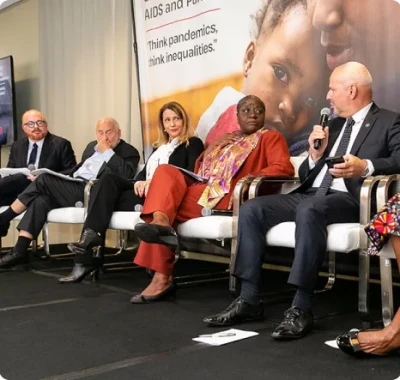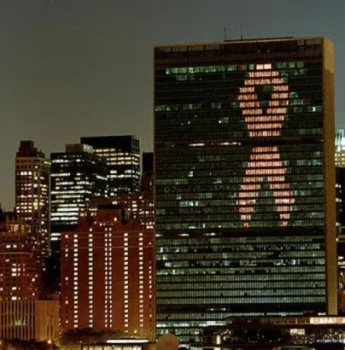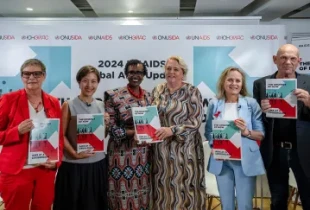How to join the Task Force
Become a Member
Join the movement to achieve the 10-10-10 Targets. Fill out our application form today!
Apply ->We welcome applications from allied organizations, civil society groups, human rights advocates, academics, and government agencies.
The Core Group team makes decisions to include new Task Force members based on consensus at regular monthly meetings. The Core Group Secretariat shares the decision with every potential Task Force member directly by email no later than 2 weeks after receiving their application or sending the invitation. All Task Force members sign a statement of shared Task Force principles and goals.



Terms of Reference
- Community leadership
- Human rights-based approach
- Commitment to addressing gender inequalities
- Decriminalization of HIV and key populations as a way forward to end inequalities and the HIV epidemic
- Decision-making transparency
- Equality and inclusion
- Shared wisdom
The Task Force is driven by the Community Core Group, which is comprised of regional key-population-led and governed networks - Eurasian Coalition on Health, Rights, Gender and Sexual Diversity (ECOM), Eurasian Women’s Network on AIDS (EWNA), Eurasian Harm Reduction Association (EHRA), Eurasian Network of People Who Use Drugs (ENPUD), Global Network of People Living with HIV (GNP+) and Sex Workers' Rights Advocacy Network in EECA (SWAN) and supported by UNDP and UNAIDS. The day to day management of Task Force and Community Core Group is done by the Secretariat, which consults with and reports to the Community Core Group.
- Working in the EECA region
- Has the 10-10-10 Targets in strategic documents or organizational strategy prioritize achievement.
- Agrees with our principles and values.
- Endorse definitions of decriminalization (based on the consensus among key populations networks) to better define goals and develop a roadmap for specific tasks in the region and in particular countries to drive decriminalization.
- Develop a specific and clear set of arguments for the 10-10-10 Targets targeting different groups involved in and affected by decriminalization (for example, politicians, decision makers, police officers), and respond to counter-arguments.
- Support efforts to change public opinion through effective work in the media and communication with different audiences.
- Coordinate the efforts of regional and national networks of communities, partners and stakeholders in the EECA region, carrying out advocacy activities at the national and regional levels.
- Address country-specific cases based on community requests or reports with a joint response to crises and risks.
- Form advocacy partnerships with interested parliamentarians and other governmental, international, and non-governmental allies.
- Prioritize the 10-10-10 Targets tasks for donor, international funding and resource mobilize for this advocacy.
- Secure political support from UN agencies for community and civil society advocacy;
- Provide expert support to strengthen community advocacy to achieve the 10-10-10 Targets.
- Work collaboratively and collectively to coordinate and support the implementation of above- listed objectives.
- Share the information about resources for the 10-10-10 Targets advocacy, best lessons of the decriminalization process, emergency cases of human rights violence of key communities using communication tools.
- Prepare consensus definitions, principles and statements of purpose;
- Participate in the regular calls between Task Force members - once per quarter for 2 hours.
- Formulate recommendations for civil society, international partners, government departments and institutions.
- Promote international decriminalization policies and help integrate them into the national context.
- Determine political barriers, as well as financial, social and structural barriers to 10-10-10 Targets.
- Get up-to-date information on Global AIDS Strategy 10-10-10 Targets;
- Easy connection with regional and global experts.
- Support in addressing country-specific cases based on community requests or reports with a joint response to crises and risks.
- Get up-to-date information on decriminalization efforts from the national level of the EECA region.
- Get up-to-date information about resources for 10-10-10 Targets advocacy, best lessons of 10-10-10 Targets process.
- Web page with all the developments and resources on decriminalization.
- Sending an update to a generated list of emails.
- Regular calls among Task Force members -once per quarter for 2 hours.
- Google Forms for collecting and analyzing the information.
- Strategic planning of the Working Group for the period 2023-2024.
- Letter from the group - on prioritizing tasks for the UN joint program (AIDS team) for the next support cycle.
- Separate negotiations with USAID on decriminalization - goal setting.
- Specific plans for communities and countries - where they are ready and able to begin proactive advocacy, and where the approach should be reactive or strategies to maintain the status quo and ensure the safety of activists.
- Determination of available resources for the work of the Task Force.